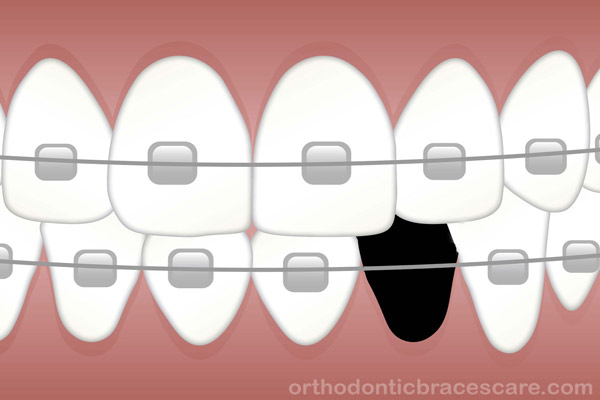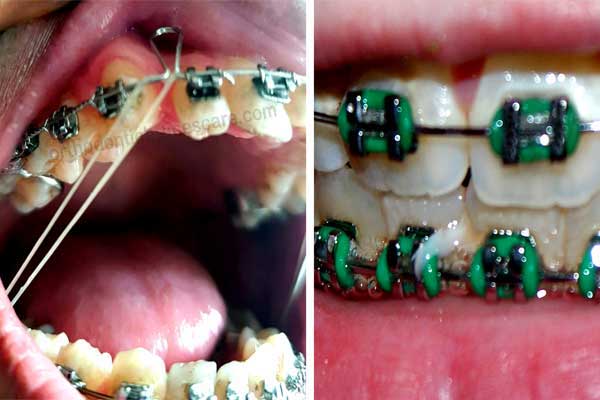Last updated on August 20th, 2022 at 11:27 am
After getting braces, you may experience pain and other issues. One common complaint of a braces wearer is, “I can’t bite down with braces.”
If you are one of them, you may want to know, why your teeth hurt to bite down with braces and what to do to get rid of this problem.
In this article, you will know about that in detail with home remedies.
Why does it hurt to bite down with braces?
Here are the reasons for which your teeth hurt when you bite down with braces.
1. Pressure from braces tightening
The first cause of your getting hurt while biting down is the force applied during braces tightening appointment.
Your orthodontist put an adequate amount of force on your teeth through braces. This helps a tooth to move into a new position.
Due to the force, your teeth feel pressure. It causes various changes within the gums and bones surrounding the teeth.
Inflammatory reaction also occurs and different substances are released into the surrounding tissue.
Because of these processes, you feel soreness for the first few days after braces activation.
So, normally, you may feel more pain and discomfort when you bite down with braces during that time.
However, it’s temporary and goes away once your teeth and mouth adapt to the changes.
In addition, when the tooth starts to move, pressure is also reduced, and gradually, you feel less discomfort.
2. Bite block keeping teeth from coming into contact
When you have a bite block on the front or back teeth with braces, you may experience additional discomfort during biting down or chewing.
A bite block doesn’t allow normal contact between teeth. Your teeth can only contact where you have the bite plates.
Because of this, when you bite down or chew, force is only localized in those areas.
Let’s know more about the bite block.
A bite block helps you during braces treatment by preventing breakage of the brackets or popping them off when you bite. To achieve this, it doesn’t allow upper teeth to come in contact to lower teeth.
Thus, it prevents slowing down the pace of orthodontic treatment.
It changes the functionality of your jaw muscles. So, you have to face some difficulty in taking a bite until you adapt to it.
3. Eating hard food
After braces tighten, your teeth get sore. In addition, when you bite into hard food, it put more pressure on your teeth. This leads to more pain and discomfort.
Normally, you experience dull pain from braces. But, chewing solid food such as Meat on the bones, beef jerky, popcorn, or hard candies can lead to more pain.
4. Too much pressure from the toothbrush
When you have sore teeth from braces in the first few days, brushing your teeth may be painful.
Sometimes, it can hurt you more when you don’t follow the right method of toothbrushing with braces or apply too much pressure on your teeth while brushing.
5. Bite plate preventing teeth from touching
If you have to wear a bite plane to correct a deep bite, you may feel discomfort from it.
As your teeth bite on the plate, they feel pressure. This leads to soreness when you bite down.
In fact, it’s normal that your teeth hurt with a bite plate because it puts pressure on those teeth where there is a deep bite. And, other teeth can’t make contact.
So, it becomes a little bit challenging to chew food or bite down with a bite plane.
In addition, you have to wear the plate for 24 hours without time for tooth cleaning. You have to wear it even when you eat.
This big piece of plastic covers the roof of your mouth and can also make you gag when you eat.
6. Loose brackets or wires
If the brackets or wires of your braces are loose, they may rub against your gums and cheeks. This might lead to pain when your bite.
7. Braces rubbing against your teeth, gums, and cheek
If the brackets and wires rub against your teeth for so long, it may damage your tooth enamel.
When this happens, you feel more pain and soreness in your teeth as well as gums. And, if it rubs against your gums or cheeks, you may get canker sores. Sometimes, braces can also cut inside your mouth.
8. Improperly-fitting braces
If your braces don’t fit well, they may hurt you. For instance, if the brackets are too tight on your teeth, they may rub against your gums and cheeks. And, if the wires are too long, they may poke into your gums or cheek.
9. New braces
If you have just got new braces, they may hurt more while biting because your teeth are not used to them yet.
Also, check out how much braces hurt.
10. Sensitive teeth
Your teeth may be more sensitive to temperature changes and pressure. So, you may feel more pain with braces.
11. Infection in the gum
An infection in the gum can also lead to pain with braces. Inflamed gums are more sensitive and can hurt you when they come in contact with braces.
12. Teeth grinding
Teeth grinding or clenching, is a common problem that can also lead to pain with braces. When you grind your teeth, it puts more pressure on them and can damage your braces.
13. Gums shrinking away from the teeth
Your gums may have shrunk away from your teeth, making them more sensitive to temperature changes and pressure.
14. Dental decays
Dental decays can also make your teeth sensitive and hurt your teeth when you bite down.
15. Root canal treatment and other dental procedures
If you have to undergo a root canal treatment, it can also lead to pain with braces. It can happen when the root canal treated tooth is weak or root canal treatment was not perfect. This is because the tooth becomes more sensitive to pressure and temperature changes.
Other dental procedures such as cleaning, filling, or extraction can also lead to pain with braces. This is because they can cause inflammation in the gums which can make them more sensitive.
Why does it hurt when I eat with braces?
There are a number of reasons for which your teeth hurt when eating with braces. The most common cause is chewing hard food or food that needs a lot of effort to chew such as meats, steak, and others. This is because chewing this food put pressure on braces as well as teeth.
Moreover, teeth hurt more during eating when you get new braces as your teeth require some time to get used to them. Eating hard foods puts additional strain on sore teeth.
Besides that, if you wear a bite block, it’ll affect chewing more. Bite blocks don’t permit your teeth to come in contact with each other. So, chewing unfavorable food may result in pain and discomfort.
This especially happens when you get new bite blocks. After about a week, you should be capable of adapting to your new chewing technique.
Does your bite change with braces?
After getting braces, not only will your teeth become aligned but your bite will be corrected. So, braces change the way you bite. In fact, it gives you an improved and more natural bite.
Why do my back teeth hurt when I bite down with braces?
When you bite down with braces, the pressure is evenly distributed across all of your teeth. However, your back teeth are larger and have a higher surface area than your front teeth. That means that they bear more of the brunt of the force when you bite down. Over time, this can lead to the development of sore spots on your back teeth.
Moreover, when you have braces, your back teeth may hurt more when you bite down. This is because the brackets and wires that make up braces can put additional force on your back teeth.
The braces put pressure on your teeth, which can cause the roots of your teeth to become irritated. The roots of your teeth are sensitive, and when they are irritated, they can cause a lot of pain.
The brackets can also rub against your gums, leading to discomfort.
In addition, when you have braces, it is difficult to keep your teeth clean. Food and plaque can build up around the braces, which can also irritate the roots of your teeth.
If you are experiencing pain in your back teeth, try to avoid hard foods and brush carefully around your braces.
If the pain persists, you should talk to your orthodontist about ways to relieve the pressure on your teeth.
Check out why one tooth hurts with braces.
What to do if you can’t bite down with braces?
If you’re wearing braces, it’s important to take extra care of your teeth to avoid any sort of damage. One potential issue is that you may not be able to bite down fully on your teeth.
If you have braces and you’re experiencing pain when you bite down, there are a few things you can do to help alleviate the discomfort.
1. First, check to see if there is anything caught in between the brackets and wires. If there is food debris, try to remove it gently with brushing or flossing. You can use a water-flosser to do it properly.
2. Next, you have to check to see if your braces are loose or damaged. If there is a popped-out wire or loose braces, you can use dental wax to prevent them from hurting. However, you need to visit your orthodontist to fix any damaged braces.
3. If everything looks secure, then rinse your mouth with warm water to help reduce any swelling.
4. You can also take an over-the-counter pain reliever to help ease the pain. However, you should avoid any type of painkiller as it will undo the effect of the braces. Consult your orthodontist for that.
5. Try to eat soft foods and avoid sticky or chewy foods that could potentially damage your braces.
7. If the pain persists, or if you notice that your teeth are shifting out of alignment, be sure to contact your orthodontist for an adjustment.
Sometimes, this can happen if the braces are too tight. So, if you can’t bite down with braces for a few days to weeks, it’s important to consult your orthodontist.
They’ll be able to make any necessary adjustments to the braces so that you can bite down properly again.
However, in most cases, it’s normal for you to feel pain when biting down after braces are tightened.
With a little care and patience, you’ll be able to get through this phase of treatment with a smile.
Check out how to relieve braces pain at home.
How do you bite with braces?
When you have braces, you will need to take extra care when biting into hard or sticky foods. Biting with braces requires a few adjustments, but once you get used to it, it will become second nature.
The first thing you need to do is learn how to position your teeth properly. This means aligning your top and bottom teeth so that they meet in the middle.
Once your teeth are properly aligned, you can then take a bite of food. Start by taking a small bite and then slowly increase the size of the bite until you are able to take a normal-sized bite.
Remember to chew slowly and evenly to avoid damaging your braces. With a little bit of practice, you will be biting with braces like a pro in no time!
But, what if you are wearing a bite block or bite plate with braces? How to bite with them?
If you are wearing a bite block or bite plate, you have to stay away from hard and sticky foods for a few days. Take soft and easy-to-chew food to stop getting hurt.
After some days, you’ll get used to the bite block or bite plate and you can deal with hard foods.
However, while taking this food, take extra care to chew it well and also cut it into small pieces.
Why do teeth hurt when biting down after braces come off?
Most of the time, you don’t feel the pain when biting down after the braces come off. However, some people may feel soreness or discomfort.
After years of being slowly moved into the correct position, your teeth may be sensitive to pressure when the braces come off. This is because your teeth have been tenderized by the brackets and wires rubbing against them for so long. Your gums may also have shrunk away from your teeth, making them more sensitive to temperature changes and pressure.
Thankfully, this pain is usually temporary and will go away within a few days or weeks as you adjust to your new smile.
You can avoid eating hard or chewy foods that could put additional pressure on your teeth.
When teeth are in alignment, the biting surfaces come together evenly. However, when teeth are crooked, the biting surfaces may not make contact at all or they may come together unevenly.
As a result, the force of the bite is not distributed evenly across the teeth, which can lead to pain.
Additionally, crooked teeth can put unnecessary stress on the jaw joint, which can also cause pain.
After braces are removed, it may take some time for the teeth and jaw to adjust to their new alignment.
With a bit of time and patience, your mouth will soon feel back to normal.
Can braces make your bite worse?
Braces don’t make your bite worse. In fact, braces are used to correct a bad bite.
A bad bite, also called malocclusion, occurs when the teeth don’t line up properly. This can cause problems with chewing and speaking, as well as pain in the jaw and face.
Braces are used to slowly move the teeth into their proper position so that the bite is corrected. In most cases, braces will improve the bite, not make it worse.
Why can’t you bite down on my back teeth with braces?
There are a few reasons why you may not be able to bite down on your back teeth with braces.
First, it could be that the braces are not properly aligned on your teeth. If the braces are not properly aligned, they will not be able to grip your teeth correctly and may slip out of place.
Second, your braces may be too tight. If your braces are too tight, they will not allow your teeth to move correctly and may cause pain.
Third, you may have a gum disease that is causing your gums to swell. This can make it difficult to bite down on your teeth.
Fourth, you might have a bite block or bite plate with braces that prevent you from biting down. These are used for treatment purposes, so nothing to worry about.
Finally, you may have a tooth that is not properly rooted in your jaw. This can cause your teeth to loosen and fall out.
Is it normal for my back teeth not to touch with braces?
It is perfectly normal for your back teeth to not touch when you have braces. This is because your orthodontist will be moving your teeth into their proper positions, and this may mean that your back teeth end up slightly further apart than they were before. This is nothing to worry about, and your teeth will eventually settle into their new positions.
Are your teeth supposed to touch the braces?
The teeth are not meant to touch the braces because the brackets are put on the outer surface of your teeth without interfering with the bite. However, if a bracket touches a tooth, it may be due to improper placement of the bracket or the bracket getting loose.
Takeaways
Normally, your teeth may hurt when you bite with braces due to the pressure from the braces. In most cases, this pain is usually temporary and will go away within a few days or weeks as you adjust to your new smile.
However, it may also occur as a result of the braces rubbing against your teeth, having sensitive teeth, inflamed gums, eating hard foods, and having a device like a bite block or bite plate.
If you are experiencing pain in your teeth while biting for more than a few days, be sure to talk to your orthodontist.

Dr. Pallab Kishore, MS in Orthodontics and owner of Orthodontic Braces Care, shares expert tips on braces, aligners, and oral health from 10+ years of experience.


